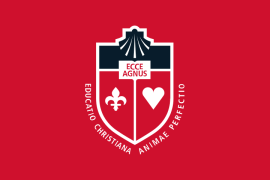Mathematics and Computer Science
What We Do
The Department of Mathematics and Computer Science is dedicated to the preparation of students for a dynamic future. Our faculty are active scholars who are devoted to student success. Each student receives individual attention from faculty members who provide research and career guidance. In our programs, students develop a strong foundation in mathematical thinking and computational skills, and our graduates go on to have successful careers in a wide variety of fields.
Programs
The Department of Mathematics and Computer Science offers the following undergraduate degrees:
For advanced graduate study, we offer two programs:
We offer several pathways allowing undergraduate students to complete graduate level coursework while still enrolled in their bachelor's program, thereby reducing the time required to earn a master of arts degree:
- BS Computing and Machine Learning/MA Applied Mathematics, Computing, and Machine Learning
- BA Mathematics/MA Applied Mathematics, Computing, and Machine Learning
- BS Mathematics/MA Applied Mathematics, Computing. and Machine Learning
- BA Mathematics/MS Finance
- BS Mathematics/MS Finance
- BS Financial Mathematics/MS Finance
- BS Biology/MS Computational Biology and Biostatistics
- BS Biochemistry/MS Computational Biology and Biostatistics
Our faculty are active researchers who provide an outstanding learning environment for students. Their research interests are diverse and include pure mathematics, applied mathematics, machine learning, computer science, functional analysis, algebra, differential geometry, and topology.
Department Contact
David Rosenthal, Ph.D.
Professor and Chair
[email protected]
Mathematics and Computer Science Minors
The minor in Applied Mathematics requires the successful completion of 21 credits.
Required (4 credits each)
- MTH 1730 University Calculus I
- MTH 1740 University Calculus II
- MTH 2750 University Calculus III
Choose three from among the following:
- CSC 1380 Introduction to Computer and Data Science or CSC 1390 Computer Programming with Calculus Applications
- MTH 2390 Introduction to Operations Research
- CSC 2600/MTH 3350 Machine Learning, Neural Networks and Deep Learning
- CSC 2630/MTH 3390 Introduction to Artificial Intelligence
- CSC 2720 Computability and Automation
- MTH 2790 Introduction to Linear Algebra
- MTH 3310 Design and Analysis of Algorithms
- MTH 3320 Introduction to Machine Learning
- MTH 3330 Data Security and Cryptography
- MTH 3340 Foundations of Data Science
- MTH 3350 Advanced Machine Learning, Neural Networks, and Deep Learning
- MTH 3360 Quantum Computing and Quantum Information Science
- MTH 3370 Machine Learning for Finance
- MTH 3380 Discrete Mathematics
- MTH 3810 Mathematical Theory of Probability and Statistics
- MTH 3840 Ordinary Differential Equations
- MTH 3850 Partial Differential Equations
- MTH 3860 Numerical Analysis
- MTH 3970 Topics in Applied Mathematics
- MTH 4830 Complex Variables
- CSC 2600/MTH 3350 Machine Learning, Neural Networks and Deep Learning
The minor in Computing, available on both the Queens and Staten Island campuses, requires the successful completion of 15 credits chosen in consultation with an advisor.
Required
- CSC 1400 Computer Science I
- CSC 1410 Computer Science II
- CSC 1470 Advanced Programming
- CSC 2450 Programming Languages
- CSC 2490 Databases
Please note that students who have completed MTH 1730 or equivalent can replace CSC 2450/2490 with any of the following:
- CSC 2510/MTH 3340 Foundations of Data Science
- CSC 2580/MTH 3310 Design and Analysis of Algorithms
- CSC 2590/MTH 3320 Introduction to Machine Learning
- CSC 2600/MTH 3350 Machine Learning, Neural Networks and Deep Learning
- CSC 2630/MTH 3390 Introduction to Artificial Intelligence
- CSC 2720 Computability and Automation
The Data Science minor requires the completion of 15-17 credits.
Required Courses
| Calculus | MTH 1220 or MTH 1320 or MTH 1730 | 3-4 credits |
| Statistics | MTH 1020, MTH 1210, or equivalent | 3-4 credits |
| CSC 1380 | Introduction to Computer and Data Science | 3 credits |
Electives
Choose two courses (six credits) from among the following:
- MTH 1040 Mathematical Models for Decision Making
- CSC 2600/MTH 3350 Machine Learning, Neural Networks and Deep Learning
- CSC 2630/MTH 3390 Introduction to Artificial Intelligence
- CSC 2720 Computability and Automation
- MTH 3310 Design and Analysis of Algorithms
- MTH 3320 Introduction to Machine Learning
- MTH 3340 Foundations of Data Science
- MTH 3970 Topics in Applied Mathematics
- MTH 4970 Independent Research in Statistics and Its Applications
Machine learning is a branch of artificial intelligence that is based on the idea that systems can learn from data, identify patterns, and make decisions with minimal human intervention. It provides methods for automating the process of analytical model building and has rapidly developing applications in many different areas such as actuarial sciences, finance, and healthcare.
The minor in Machine Learning requires the successful completion of 15-17 credits, chosen in consultation with an advisor.
Required
- CSC 1030 Machine Learning for Everyone
- MTH 1220/1260/1320/1730 Calculus
- MTH 1020/1210/3810 or PSY 2030 or SOC 2610 Statistics
- CSC 2590/MTH 3320 Introduction to Machine Learning
Choose one of the following:
- CSC 2510/MTH 3340 Foundations of Data Science
- CSC 2580/MTH 3310 Design and Analysis of Algorithms
- CSC 2600/MTH 3350 Machine Learning, Neural Networks and Deep Learning
- CSC 2630/MTH 3390 Introduction to Artificial Intelligence
- CSC 2620/MTH 3370 Machine Learning for Finance
- CSC 2720 Computability and Automation
- CSC 4980/MTH 4980 Independent Research in Machine Learning and Artificial Intelligence
The Mathematics minor requires completion of the following courses, for a total of 21 credits:
- MTH 1730 University Calculus I (4 credits)
- MTH 1740 University Calculus II (4 credits)
- CSC 1380 Introduction to Computer and Data Science or CSC 1390 Computer Programming with Calculus Applications
- MTH 2700 Introduction to Mathematical Thinking
- MTH 2750 University Calculus III (4 credits(
- MTH 2790 Introduction to Linear Algebra


